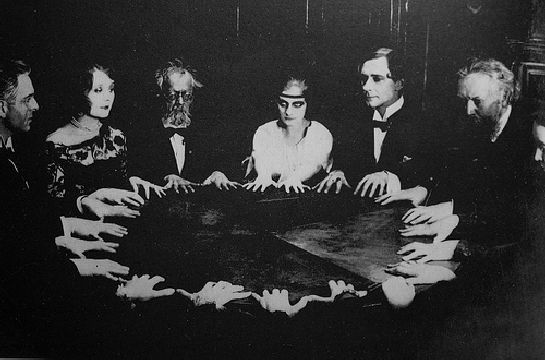Dr Mabuse: The Gambler (1922) 

Director: Fritz Lang
Cast: Rudolf Klein-Rogge, Aud Egede-Nissen, Gertrude Welcker
Synopsis: Arch-criminal Dr. Mabuse sets out to make a fortune and run Berlin. Detective Wenk sets out to stop him.
Criminal masterminds have come a long way since the dark days of 1922. More often than not, they operate from spacious lairs hidden away on the sea bed or in a volcano or on top of a mountain, but back then they operated out of slightly shabby parlours with net curtains but no wardrobes for their outfits, just a collection of garment rails. And while today’s master of disguise might have a changing room set aside for fashioning their transformations, back in 1922 all the diabolical Dr Mabuse (Rudolf Klein-Rogge — Die Nibelungen: Siegfried, Metropolis) had was a cluttered desk on which three forlorn wigs sit on their stands amongst the artist’s paraphernalia.
But then Mabuse is a criminal mastermind whose ambitions leave much to be desired. He wields the power to control the minds of others, and yet instead of targeting kings and ministers he chooses to cheat at cards by influencing his opponents into playing losing hands no matter how good the cards they hold. We do see him manipulating the stock market early on by stealing a proposed trade agreement which sends the market into a frenzied panic. While everyone else sells, sells, sells, he buys, buys, buys, and makes a killing. But after that, his schemes are strictly small-time. He sends Cara Carozza (Aud Egede-Nissen — Anna Boleyn), a devoted acolyte who haunts the dance halls and gambling dens of Weimar-era Germany, to beguile Edgar Hull (Paul Richter — Die Nibelungen: Siegfried), the son of a wealthy industrialist. While Mabuse uses his intense, hawk-like stare on the young American to force him into losing huge amounts of money at the card table, Cara worms her way into his heart, presumably in the hope that, through him, she and Mabuse can get their hands on his father’s millions, although this is never really explained in the film.
Hull’s plight comes to the attention of Chief Inspector Norbert von Wenck (Bernhard Goetzke — Die Nibelungen: Siegfried, Jew Suss), the film’s nominal hero, but when Mabuse realises Hull has an ally on the police force he determines to eliminate them both. Unfortunately for Mabuse, the only sidekicks he has at his disposal are an effete, cocaine-addicted manservant (Robert Forster-Larringa), a fat slob (Karl Huszar — The Man Who Laughs), and an inept hit-man (Georg John — Metropolis, M) who gets himself arrested while planting a bomb in von Wenck’s office.
According to Fritz Lang, the director of Dr Mabuse: The Gambler, there was originally a prologue to the movie which gave a brief resume of German history since the defeat of the Great War. This prologue provided a context against which the following saga unfolds and an allegorical subtext which must have added a certain gravitas to the original version, but which time — and the tone of the film — has subsequently blunted. The storyline is diminished by the kind of melodramatic acting associated with cheap serials of the day, and features a surfeit of suicides and murders, abductions, a séance, a booby-trapped taxi cab, a gunfight (in which dense clouds of smoke substitute for the sound of gunfire) and more. All this means that Dr Mabuse: The Gambler should be a roller coaster ride despite its faults, but its pace is ponderous even for a silent movie, and the four-hour running time eventually becomes an endurance test. Lang’s apparent determination to show every detail of Mabuse’s schemes means that scenes last two, sometimes three times, longer than they really should. While this enables the director to create a nicely brooding atmosphere, it also tests to breaking point the patience of even the most tolerant of modern-day viewers.
(Reviewed 4th October 2014)
httpv://www.youtube.com/watch?v=mQqiwIgTUHA
